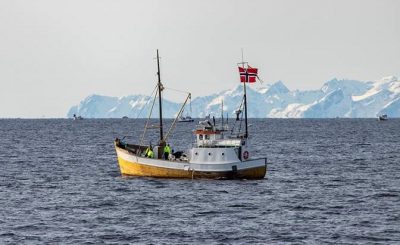Norway’s and the UK’s failure to strike a new post-Brexit free trade agreement by January 1 is unleashing new concerns, even with an interim transition deal in place. It also points up conflicts, within Norway’s own negotiating team, that once again have pitted Norway’s powerful farming lobby against its important fishing industry.

Newspaper Dagens Næringsliv (DN) reported Thursday how the British have offered to reduce customs duty on both fish and processed fish products from Norway. That, writes DN commentator Kjetil Wiedswang, “is music to the ears” of both the Norwegian seafood industry (the country’s largest second only to oil and gas) and small coastal communities that have lost seafood processing business for years. The UK is a huge market for Norwegian fish (to the tune of NOK 2.4 billion in sales last year), and if Norway can export even more fillets and other seafood products, local communities may be able to resurrect their local processing facilities and create jobs, while sending lots more fish across the North Sea.
In return, however, the British want lower tariffs and higher quotas to export more of their agricultural products to Norway. Norwegian consumers would likely benefit from a wider selection and lower prices, but Norwegian farmers and their protectors in Parliament and government are already “seeing red,” according to DN. Norway’s farm lobby always fights competition from abroad in order to preserve the country’s expensive agricultural industry that needs constant subsidy to survive. The last thing dairy farmers in Norway want is more imports of British cheese, for example, that would compete with their own. Norwegian politicians usually give in to the farmers’ demands, on the grounds that farming can help keep rural areas populated and preserve local food supplies.
Farmers keen to prevail again
Norway’s farm lobby has thus won over the fishing lobby in the past, and kept Norway’s borders mostly closed to agricultural imports on a seasonal basis. With seafood now recognized, though, as a billion-kroner industry that generates jobs, while farming demands subsidy and relies on consumer willingness to pay some of the highest food prices in the world, DN‘s Wiedswang questions how long Norway can afford to put a priority on its costly farming industry at the expense of one of its most important export industries.
“It can continue as long as oil billions continue to roll in,” Wiedswang suggests, but adds that it won’t be long before Norwegian officials will need to prioritize industries that generate both jobs, export- and tax revenue, and can be profitable instead of being costly for the state.
“The agricultural lobby may win (the post-Brexit trade battles) once again,” Wiedswang wrote, “but it can be one of their last victories.”

Norway’s foreign ministry is coordinating all the negotiations with the UK, while most of the negotiating work itself is conducted through the agriculture-, fishing- and trade ministries. They’re in turn striving to get labour, employers’ and other industrial organizations within Norway to come to terms, before they can do the same with their British counterparts.
In addition to conflicts over seafood and agriculture quotas, there are myriad other issues at stake in the post-Brexit new deal-making process. They include trade of all sorts of industrial products but also services and the free movement of people and workers over borders. Norsk Industri, Norway’s national industrial employers’ organization, worries that any disruptions will hit shipyards and the offshore industry hard. There’s traditionally been lots of personnel exchange across the North Sea, notes newspaper VG, not least in connection with installation of technical equipment, maintenance and engineering services. It’s been mostly problem-free under Norway’s trade agreement with the EU. Now Norway needs at least as problem-free an agreement with the UK.
Another national employers’ organization, NHO, has also worried about border controls in and out of the UK after Brexit, fearing they’ll complicate and delay what has been mostly seamless transport. The temporary transitional agreement announced Wednesday is aimed at securing current rules and regulations (and avoiding disruptions) until bilateral versions are hammered out between Norway and the UK.
‘A limited agreement’
Norwegian Trade Minister Iselin Nybø claimed that negotiations are continuing at full tempo until a new deal with the UK is reached, hopefully “a few months” into the New Year. “It’s nonetheless important that Norwegian businesses remain aware that this is a limited agreement, both in terms of its extent and longevity,” Nybø stated in a press release. The new deal will also apply to the UK’s trade with Norway’s two partners in their joint deal with the EU, Liechtenstein and Iceland.
Foreign Minister Ine Eriksen Søreide, who continually stresses how the UK is Norway’s single largest trade partner after the EU as a whole, said it was most important to ensure now that trade of goods between the UK and Norway “can continue after January 1 on the same terms as today.” She described the new deal as a “bridge” to a new bilateral deal that’s intended to be every bit as good as the deal Norway had with the UK through the EU. Even though negotiations continue at “full force,” Søreide said there’s still so much work ahead that it “wasn’t realistic” to complete a deal that could take effect from January 1, 2021.
“We agree on the need for an ongoing deep and extensive cooperation,” Søreide claimed in Wednesday’s press release, while conceding that negotiations on “an ambitious and extensive free trade deal are now in an intense and demanding phase.” It remained unclear when a permanent deal will be in place.
NewsInEnglish.no/Nina Berglund

